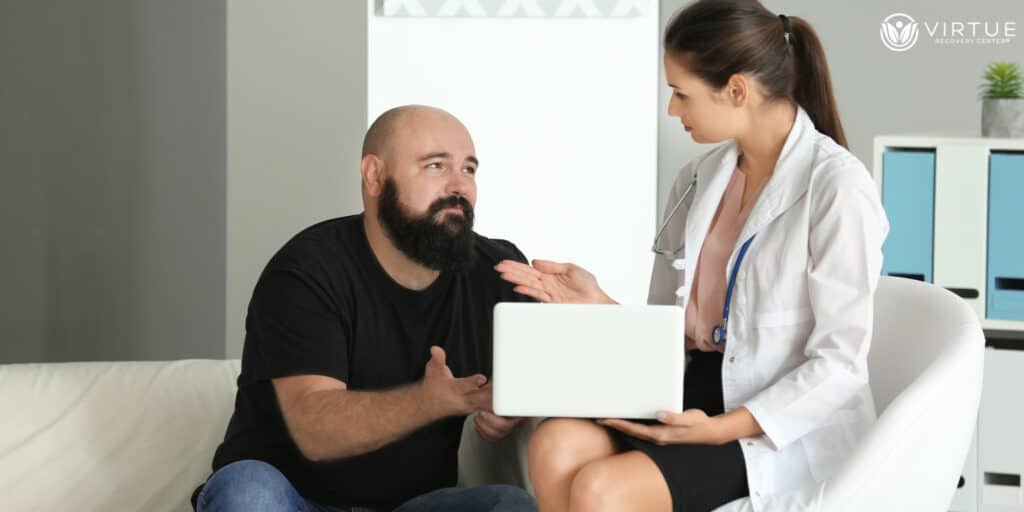
Table of Contents
Key Takeaways
- If untreated, depression and prescription drug abuse can worsen one another.
- Misusing opioids, benzodiazepines, and stimulants significantly increases the risk of addiction.
- Comprehensive mental health treatment addresses root causes, not just symptoms.
- Integrated treatment programs with therapy, medication management, and peer support offer the best outcomes.
- Early intervention and ongoing aftercare significantly reduce relapse and support lasting recovery.
Introduction
Millions of individuals of all ages and backgrounds in the United States struggle with depression, making it one of the most common mental health challenges. People experiencing prolonged sadness, hopelessness, or difficulty managing daily stress may turn to prescription medicines for relief. Unfortunately, this can lead to the misuse of opioids, anti-anxiety medications, or stimulants as a form of self-medication.
This cycle often results in dependency, worsening depression, and serious health consequences. When depression and substance abuse occur together, each condition fuels the other, creating a dangerous cycle. While medications may dull emotional pain temporarily, side effects and withdrawal symptoms can intensify depression over time. Breaking free requires professional mental health treatment that addresses both conditions simultaneously.
What Do Depression and Prescription Drug Misuse Have in Common?

There is a strong connection between depression and prescription drug abuse because both affect the brain’s reward and stress systems. While medications like antidepressants or anti-anxiety drugs can be safe under medical supervision, misuse occurs when people take higher doses, mix substances, or continue use without need.
Some individuals misuse opioids, sedatives, or stimulants without prescriptions to escape feelings of sadness or fatigue. Over time, tolerance builds, requiring larger amounts to feel the same effects. This cycle worsens depression and makes recovery nearly impossible without expert intervention.
Why Do People With Depression Use Prescription Drugs?
Many individuals abuse prescription medications because they provide temporary relief from emotional pain. However, these effects fade quickly. When the drugs wear off, symptoms of depression often return even stronger. Without proper mental health therapy, unresolved trauma, chronic stress, or grief continue fueling the cycle of drug abuse. Research such as the Prescription Opioids and Depression Pathways Cohort Study highlights how misusing medications can intensify depressive symptoms and complicate recovery.
What Part Does Mental Health Treatment Play in Getting Better?
Mental health treatment is critical because it addresses both depression and substance misuse. Comprehensive programs integrate medical and therapeutic methods, offering a complete pathway to recovery. Effective approaches include:
- Therapy and Counseling – Cognitive-behavioral therapy (CBT) and other evidence-based practices help individuals reframe negative thoughts, build coping skills, and manage triggers.
- Medication Management – When monitored, prescription medications regulate mood and reduce cravings without leading to dependency.
- Dual Diagnosis Care – Integrated programs treat both mental illness and addiction simultaneously for stronger outcomes.
- Supportive Environments – Peer support, group therapy, and aftercare provide belonging and reduce isolation.
This holistic approach ensures long-lasting recovery rather than temporary symptom relief. The National Institute on Drug Abuse emphasizes that dual diagnosis programs are essential for breaking the cycle of relapse.
Can Misusing Prescription Drugs Make Depression Worse?

Yes. Misusing prescription drugs often worsens depression because these substances alter brain chemistry in harmful ways:
- Opioid abuse reduces endorphin production, limiting the brain’s natural ability to feel pleasure.
- Benzodiazepine misuse may impair memory and cognitive functioning, increasing hopelessness.
- Stimulant abuse often leads to “crash” periods marked by irritability, exhaustion, and mood swings.
Withdrawal further intensifies depression, making it challenging to stop without supervised detox and treatment programs.
How Does Mental Health Treatment Break the Cycle of Misuse?
Mental health treatment is most effective when it addresses the broader behavioral health picture. Someone struggling with depression may self-medicate with prescription drugs, while also dealing with disordered eating habits rooted in the same emotional pain.
In these cases, an eating disorder program can work alongside addiction services, providing structured therapy, nutritional counseling, and medical monitoring to reduce health risks and restore balance.
Conclusion
The link between depression and prescription drug abuse is complex and dangerous, but recovery is possible. With professional care that addresses both conditions, individuals can break the cycle of self-medication, reduce relapse risk, and rebuild healthier lives.
At Virtue Recovery Center, we specialise in compassionate, evidence-based treatment for co-occurring disorders. Our programs integrate therapy, peer support, and medical care to address both depression and substance use effectively. If you or a loved one is struggling, call us today at 866-461-3339 to begin your path to recovery.
FAQs
What kinds of prescription medicines do people with depression most often abuse?
The most commonly misused drugs are opioids, benzodiazepines, and stimulants—each carrying high risks of dependency.
Is it possible to recover from both depression and prescription drug abuse at the same time?
Yes. Dual diagnosis treatment addresses both conditions simultaneously, leading to stronger recovery outcomes.
Why is it dangerous to stop using prescription medications without help?
Stopping suddenly can trigger severe withdrawal symptoms like anxiety, seizures, or worsened depression. Medical detox ensures safety and comfort.
Does treatment for depression always include medication?
Not always. Some recover through supervised medication use, while others improve through therapy, lifestyle changes, and holistic care.
How can I tell if my loved one needs professional help?
Warning signs include taking higher doses, mixing drugs, experiencing withdrawal, or showing signs of severe depression. In such cases, professional addiction treatment is strongly recommended.
Resources:
- National Institute of Mental Health. “Finding Help for Co-Occurring Substance Use and Mental Disorders.” NIMH, https://www.nimh.nih.gov/health/topics/substance-use-and-mental-health
- National Institute on Drug Abuse. “Co-Occurring Disorders and Health Conditions.” NIDA, https://nida.nih.gov/research-topics/co-occurring-disorders-health-conditions
- Scherrer, Jeffrey F., et al. “The Prescription Opioids and Depression Pathways Cohort Study.” PubMed Central (NIH), 2020, https://pmc.ncbi.nlm.nih.gov/articles/PMC7295174/
Are You Covered For Treatment?
At Virtue Recovery Center, we understand the importance of accessible care. That’s why we’re in-network with numerous private insurance companies, ensuring that your journey to recovery is supported from the start. Let us help you quickly and easily verify your insurance coverage. Begin your path to healing today.
- About the Author
- Latest Posts
Gigi Price( Clinical Director )
Gigi Price holds licenses as a Master Social Worker and Clinical Drug Counselor. She completed her master’s degree in Social Work at Texas State University. Over the last decade, Gigi has been dedicated to utilizing evidence-based practices to enhance patient care and treatment planning, resulting in positive, long-term outcomes for patients and their families. Her passion lies in creating a treatment environment where professionals collaborate to bring about positive change and provide a safe, trustworthy therapeutic experience. Patients can be confident in receiving top-quality care under her leadership.
In her role as the Clinical Director of Virtue Recovery Houston, Gigi conducted research to identify the most effective approaches for treating patients with acute mental health diagnoses, PTSD, and Substance Use Disorder. She then assembled a team of skilled clinicians who could offer various therapeutic modalities, such as Cognitive Behavioral Therapy (CBT), Dialectical Behavioral Therapy (DBT), Acceptance and Commitment Therapy (ACT), Somatic Exposure, Eye Movement Desensitization and Reprocessing (EMDR), and Cognitive Processing Therapy (CPT). Gigi takes pride in overseeing the development and implementation of Virtue Houston’s Treatment Program, which includes two specialized therapeutic curricula tailored to the unique needs of individuals struggling with mental health issues, addiction, and PTSD.
How Cognitive Behavioral Therapy Supports Lasting Sobriety After Cocaine Addiction …
How an Eating Disorder Program Helps Manage Binge-Eating Episodes Key …
Key Takeaways Regular exercise reduces cravings and withdrawal symptoms. Physical …
Key Takeaways Veterans Day began as Armistice Day in 1918 …
Key Takeaways Proper nutrition plays a vital role in addiction …
Key Takeaways Long-term sobriety is achievable with evidence-based addiction treatment …


























